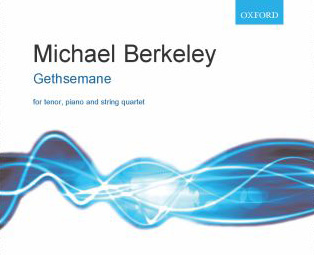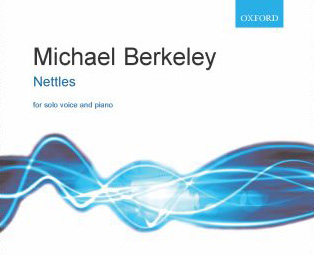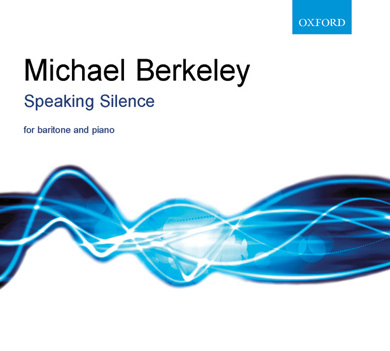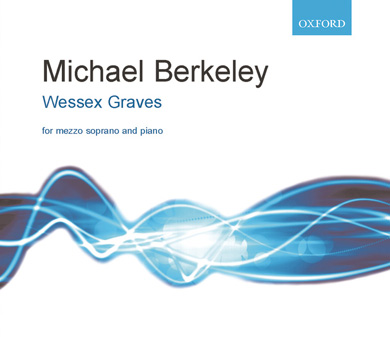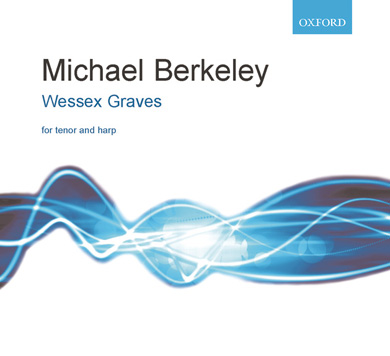Accompanied song
Ballet
Brass ensemble
Brass quintet
Chamber orchestra
Choral
Choral with orchestra
Concerto
Ensemble with string orchestra
Exhibition
Guitar
Instrumental
Instrumental ensemble
Opera
Quintet
Solo instrumental
String orchestra
String quartet
String trio
Vocal with chamber orchestra
Wind band
Wind quintet
Accompanied song works
A Time of Rapture
Year of composition: 2022
Belinda and Julius Drake were generously responsible for the creation on this new song. The text, suggested by them, comes from Wordsworth’s The Prelude in which the poet recalls his own personal embrace of nature. At first I struggled to see a way to set these dynamic lines but Schubert gave me the answer in his irresistible conjuring up of journeys on powerful steeds. The song is bookended with a contrastingly introverted phrase from my cycle, Speaking Silence, suggesting first the abstract nature of rapture and, finally, the dying sun of evening.
A Time of Rapture was premiered at the 2022 West Cork Festival by Lotte Betts-Dean and Julius Drake.
Echo
For soprano and piano
Duration: 3 minutes
Audio samples:
- Echo
Written for the NMC Songbook, this homage to Francis Poulenc rejoices in the bitter sweet harmony that he used to relish. Of a romantic, wistful nature, the words are concocted by Berkeley and also have a slightly French, Apollinaire-like sensibility with a deliberate use of elliptical contradiction: 'I hear your silent voice' etc.
An indulgent gem for any good soprano.
Epitaphs of War
Duration: 6 minutes
Year of composition: 2018
Published by michaelberkeley.co.uk
Epitaphs of War are written by Kipling and set to music as a song cycle for bass baritone by Michael Berkeley. Michael's first opera Baa Baa Black Sheep dealt with the damage done to Kipling in his childhood which resulted in his fantasising about a magical world where animals would extract revenge on his behalf. When Kipling lost his son, John, in the First World War he again felt bitterness, anger and loss. In his Epitaphs he went back to a Greek tradition of short, pithy and dark lines. In the third song, 'Bridegroom', Michael uses an almost folk-like melody and accompaniment.
Michael writes about his work below.
When David Malouf and I embarked on my first opera I immersed myself in Rudyard Kipling’s work. Baa Baa Black Sheep was based on Kipling’s autobiographical short story of the same name about a young boy being sent back to England from Colonial India. Kipling was often locked in a cupboard and began to lose his sight thanks to the cruelty of the woman in whose care he has been entrusted. David’s stroke of brilliance was to marry this story to the Jungle Book so as to enact the fantasies of a child wreaking revenge on adults through the help of animals.
Bitterness and revenge were to inform much of Kipling’s writing from then on and when he lost his son, John, in the First World War the wound was re-opened and the Kipling who had espoused patriotic fervour about the virtues of going to war became the very embodiment of its savage antithesis.
In his Epitaphs of War Kipling went back to a Greek tradition of short, pithy and dark lines. So these settings have an almost operatic drama – sharp bursts of fury. The first is ironically entitled The Coward.
A Dead Statesman has a Wilfred Owen-like reference to ‘the defrauded young’.
In The Bridegroom, the bride is death but there is also an almost resentful glance at the beloved for whom life will cure the pain of memory.
Finally in Pelicans in the Wilderness (A Grave Near Halfa), there is envy of those who can still return to their young each evening.
EPITAPHS OF WAR
1. The Coward
I could not look on Death, which being known,
Men led me to him, blindfold and alone.
2. A Dead Statesman
I could not dig: I dared not rob:
Therefore I lied to please the mob.
Now all my lies are proved untrue
And I must face the men I slew.
What tale shall serve me here among
Mine angry and defrauded young?
3. The Bridegroom
Call me not false, beloved,
If, from thy scarce-known breast
So little time removed,
In other arms I rest.
For this more ancient bride
Whom coldly I embrace
Was constant at my side
Before I saw thy face.
Our marriage, often set—
By miracle delayed—
At last is consummate,
And cannot be unmade.
Live, then, whom Life shall cure.
Almost, of Memory,
And leave us to endure
Its immortality.
4. Pelicans in the Wilderness
(A Grave Near Halfa)
The blown sand heaps on me, that none may learn
Where I am laid for whom my children grieve. . . .
O wings that beat at dawning, ye return
Out of the desert to your young at eve!
Gethsemane
For tenor, piano and string quartet
Duration: 10 minutes
Year of composition: 2003
This ten minute sacred scena was commissioned by The Nash Ensemble and is dedicated to Amelia Freedman. I have concocted my own text using lines from the four gospels as they describes Christ's doubts in the Garden of Gethsemane.
It is an episode that I find particularly endearing and human since it shows Jesus in a rare moment of utter frailty and fear. In asking his Father if 'this cup might pass' from him, Christ has the awful ability to both foresee his crucifixion yet know that his suffering cannot be mitigated by his divine status. Though the prevailing mood is one of anguish, I have pointed-up a moment of warmth and tranquility when, finding his disciples asleep for the third time, Jesus bids them to sleep on, as though momentarily glimpsing for himself the glow of eternal peace. Similarly I have also emphasised the duality of context for the famous phrase 'the spirit is willing but the flesh is weak' - which has resonance for both the disciples and, momentarily, Christ as well. The music concludes with an inversion of the all-pervasive ostinato figure with which it opened. Now though, the direction of the relentless footfall which began as it made its way up the Mount of Olives is reversed, but the mood is scarcely the less ominous for that.
Grenadier
For voice, violin and cello
Duration: 2 minutes
Published by Oxford University Press
Grenadier was commissioned by the Housman Society as part of the celebrations for the centenary of the publication of A Shropshire Lad and received its first performance in Ludlow on 20 July 1996 when the singer was Mary Wiegold with members of The Composers Ensemble. What particularly drew me to this short poem about a young man plucked from daily life to serve and die for the queen for thirteen pence a day, was its sense of melancholic futility. In this, and in its irony, it reminds me all too sadly of Wilfred Owens most affecting poems and indeed his fate.
I deliberately chose to set the words of Grenadier with a folk-like simplicity while the accompaniment is little more than an incessant drum beat. Thus the instruments used are interchangeable.
Hollow Fires
For baritone and piano
Duration: 9 minutes
Year of composition: 2011
Published by Oxford University Press
Hollow Fires is a cycle of four songs, setting texts by Hardy and Housman on the subject of love and loss.
Nettles
For voice and piano
Duration: 5 minutes
These two short songs for high voice and piano are set to texts by A E Housman and Edward Thomas.
Poem (for mezzo-soprano and viola)
Published by michaelberkeley.co.uk
Speaking Silence
For baritone and piano
Duration: 20 minutes
These songs were especially written for David Wilson-Johnson, whose voice and artistry I very much admire. Since he sang in the first performance of my oratorio Or Shall We Die?, we have been planning this cycle of songs. The texture and range of the voice suggested to me poetry of yearning and longing and this also allowed me to continue the ideas I had begun in my recent song cycle for Heather Harper with Songs of Awakening Love. However, where Heathers songs were for orchestra and soprano, and dealt with first love, these songs for mezzo-soprano and piano comes at the end of the love cycle. You might say that where Heathers songs belonged to the day, this new cycle has very much the atmosphere of night and indeed, the desire for rest and even oblivion is frequently mentioned.
Things Invisible To See
Year of composition: 2024
Published by michaelberkeley.co.uk
This John Donne song cycle consists of:
1. Go and Catch a Falling Star
2. The Sun Rising
3. John Donne; His Farewell Fancy (piano interlude)
4. Break of Day
5. The Message
Three Cabaret Songs
Year of composition: 2013
Published by michaelberkeley.co.uk
The Trasimeno Festival in Italy was the venue for the first performance of Three Cabaret Songs to words by Ian McEwan. These songs were commissioned by Angela Hewitt who performed them with the renowned Canadian Soprano, Barbara Hannigan, on July 3rd 2013.
Three Rilke Sonnets
Year of composition: 2010
Published by Oxford University Press
Three Rilke Sonnets were written following a conversation I had with Amelia Freedman after a Nash Ensemble Prom in which Claire Booth had sung with great beauty.
I chose the Rilke for its elliptical and elusive language, but since even the finest translation cannot really do these lines justice, I opted to set them in the original German.
The Sonnets to Orpheus come from one of Rilke's most powerful and impulsively creative periods of writing. There is a theme of intangible loss running through my selection, which moves, in my mind, from childhood to adolescence and then full-blown youth.
The first features the bass flute - so like the Shakuhachi and, in fact, the enigmatic nature of the poems have for me a Haiku like quality but with many more layers in the sub-strata. This poem, No. VIII from part two of the Sonnets to Orpheus, recalls a childhood friendship where only a ball and its wondrous arc can be remembered as something truly real.
Perhaps because of recent hearing problems, which have led me to a more economic use of notes, but also because of the nature of the poem, the second (No. II from Part One) is a duet for intertwining soprano and solo viola. An almost girl, half ethereal, invades the memory through, as Rilke puts it, bedding down within the ear.
Finally, No. XVIII from Part Two remembers and revels in the movements of a dancer and, at the last line, where the poet describes the similarity between the curve of an eyebrow and an elegant turn, the music recapitulates and re-writes the sound of the marvelously arcing ball in the last line of the opening song allowing the bass flute to then echo its opening motif.
This video performance was produced by Josipa Bainac and the Austrian Cultural Forum in London as a contribution to Austrian-English music cooperation.
Three songs to children
For soprano or tenor and piano
Duration: 10 minutes
Published by Oxford University Press
A Cradle Song
Sonnet to a Child
A Child Asleep
One of my earliest compositions to survive the bottom drawer is the Three Songs to Children. I do rather like the direct simplicity of A Cradle Song and A Child Asleep, short, touching poems by Yeats and de la Mare, with a central, more ambitious setting of a much more ambitious poem by Wilfred Owen.
A Cradle Song: W B Yeats
The angels are stooping
Above your bed;
They weary of trooping
With the whimpering dead.
Gods laughing in Heaven
To see you so good;
The Sailing Seven
are gay with His mood.
I sigh that kiss you,
For I must own
That I shall miss you
When you have grown.
Sonnet to a Child: Wilfred Owen
Sweet is your antique body, not yet young;
Beauty withheld from youth that looks for youth;
Fair only to your father. Dear among
Masters in art. To all men else uncouth;
Save me, who know your smile comes very old,
Learnt of the happy dead that laughed with Gods;
For earlier suns than ours have lent you gold;
Sly fauns and trees have given you jigs and nods.
But soon your heart, hot-beating like a birds,
Shall slow down. Youth shall lop your hair;
And you must learn wry meanings in our words.
Your smile shall dull, because too keen aware;
And when for hope your hand shall be uncurled,
Your eyes shall close, being open to the world.
A Child Asleep: Walter de la Mare
Angel of words in vain I have striven with thee not
Plead a life times love or loyalty only with envy bid thee watch this face
that says so much so flawlessly, so flawlessly and in how small a space.
Touch Light
Duration: 8 minutes
Published by Oxford University Press
Audio samples:
- Touch Light
The idea of writing a duet for soprano and counter-tenor immediately put me in mind of Monteverdi and Handel but when I looked more closely at the scores, the texts (and music) they employed for rapturous moments can usually be boiled down to a very simple language - a caro mio or mi tesoro. In other words it was going to be hard to find a text or a poem that was sufficiently spare and that would offer opportunities for two voices. So I decided to distil the essence of some of these ecstatic moments into my own words and also employed a variation on the ground bass which lies at the heart of some of my favourite arias and duets - Dido's Lament by Purcell or the final great duet from Poppea by Monteverdi. Touch Light is, then, a homage to these masters of early opera and though originally envisaged with a counter tenor and soprano it is not exclusive to these voices.
My heart, my breath, my life, my death,
Light so bright I scarcely see,
Touch so light I barely feel
My breath, my life, my heart, my death.
Touch Light was commissioned for the 2005 Tetbury Music Festival to celebrate the marriage of Katie Smith and Jonnie Wake, and first performed by the Kings Consort, Lorna Anderson and Robin Blaze, directed by Robert King.
Two as One
Duration: 6 minutes
Published by michaelberkeley.co.uk
When Elise Smith asked me for a companion piece to Touch Light to celebrate her and Sir Martin Smith’s 50th wedding anniversary she suggested a poem by the 17th century Anne Bradstreet, To My Dear and Loving Husband. So I looked to Bradstreet’s contemporary, Purcell, for further inspiration and the repeat of a two-bar harmonic sequence which is subject to harmonic modulation to ramp up the emotion. For instance, at the apotheosis of the duet, the music moves from C Minor to Bach’s favourite key for expressions of joy and radiance, D major. But there was also contemporary input from a Pet Shop Boys concert and the way in which Neil Tennant uses his voice and harmonic sequencing.The music begins with the strings pulling away from a single note in quarter tones as if to depict the cellular division from one to two thus getting the music underway and into the sequence. Two as One lasts approximately six minutes.
The 2021 Tetbury Music Festival's Gala Concert includes the World Premiere of 'Two as One'.
Typewriter Music (for mezzo-soprano and cello)
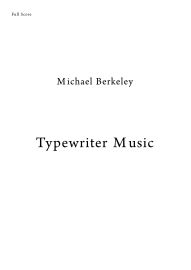
Typewriter Music (for mezzo-soprano and cello)
Two Songs for DavidPublished by michaelberkeley.co.uk
Year of composition: 2014
Audio samples:
- Typewriter Music (for mezzo-soprano and cello)
Typewriter Music was commissioned for, and set to words by, the Australian writer David Malouf. It is the second of two songs for David. It was premiered by Jenny Duck-Chong (mezzo-soprano) and Geoffrey Gartner (cello) in a private concert in 2014, and received its first public performance in a concert in Australia in April 2016.
Wessex Graves (for mezzo-soprano and piano)
For mezzo-soprano and piano
Duration: 17 minutes
She at his funeral - Drummer Hodge - In the moonlight - Ah, are you digging on my grave? - Her secret
Song cycle originally scored for tenor and harp. This arrangement was previously on hire and these songs are among Berkeley's earliest compositions, written in the mid-1970s at the suggestion and encouragement of Peter Pears. They are deliberately written in a folk-song idiom, partly because the nature of the words suggested this style. The poems, by Thomas Hardy, were chosen for various treatments of one theme - death, and the grave. Some are wistful, some tragic, some humorous. There are no better programme notes than the words themselves.
She at his funeral
They bear him to his resting place -
In slow procession sweeping by;
I follow at a strangers space;
His kindred they, his sweetheart I,
Unchanged my gown of garish dye,
Though sable-sad is their attire;
But they stand round with griefless eye,
Whilst my regret consumes like fire!
Drummer Hodge
They throw in Drummer Hodge, to rest
Uncoffined - just as found;
His landmark is a kopje-crest
That breaks the veldt around;
And foreign constellations west
Each night above his mound.
Young Hodge the Drummer never knew -
Fresh from his Wessex home -
The meaning of the broad Karoo,
The Bush, the dusty loam,
And why uprose to nightly view
Strange stars amid the gloam.
Yet portion of that unknown plain
Will Hodge for ever be;
His homely Northern breast and brain
Grow to some Southern tree,
And strange-eyed constellations reign
His stars eternally.
In Moonlight
O lonely workman, standing there
In a dream, why for you stare and stare
At her grave, as no other grave there were?
If your great gaunt eyes so importune
Her soul by the shine of this corpse-cold moon,
Maybe youll raise her phantom soon!
Why, fool, it is what I would rather see
Than all the living folk there be;
But alas, there is no such joy for me!
Ah she was one you loved, no doubt
Through good and evil, through rain and drought.
And when she passed, all your sun when out?
Nay: she was the woman I did not love,
Whom all the others were ranked above,
But during her life I thought nothing of.
Ah, are you digging on my grave?
Ah, are you digging on my grave,
My loved one? Planting rue?
- No: yesterday he went to wed
One of the brightest wealth has bred.
It cannot hurt her now, he said,
That I should not be true!
Then who is digging on my grave?
My nearest dearest kin?
Ah, no: they sit and think, what use!
What good will planting flowers produce?
No tendance of her mound can loose
Her spirit from Deaths gin.
But some-one digs upon my grave?
My enemy? Prodding sly?
Nay: when she heard you had passed the Gate
That shuts on all flesh soon or late,
She thought you no more worth her hate,
And cares not where you lie.
Then, who is digging on my grave?
Say - since I have not guessed!
- O it is I, my mistress dear,
Your little dog, who still lives near,
And much I hope my movements here
Have not disturbed your rest?
Ah, yes! You dig upon my grave...
Why flashed it not on me
That one true heart was left behind!
What feeling do we ever find
To equal among human kind
A dogs fidelity!
Mistress, I dug upon your grave
To bury a bone, in case
I should be hungry near this spot
When passing on my daily trot.
Im sorry, but I quite forgot
It was your resting place.
Her secret
Her loves dull smart distressed my heart
He shrewdly learnt to see,
But that I was in love with a dead man
Never suspected he.
He searched for the trace of a pictured face,
He watched each missive come,
And a sheet that seemed like a love-line
Wrought his look lurid and numb.
He dogged my feet to the city street,
He followed me to the sea,
But not to the nigh, still churchyards
Did he dream of following me!
Wessex Graves (for tenor and harp)
For tenor and harp
Duration: 17 minutes
Song cycle for tenor (or mezzo-soprano) and harp to words by Thomas Hardy.
She at his funeral - Drummer Hodge - In the moonlight - Ah, are you digging on my grave? - Her secret
The composer writes:
These songs are among my earliest compositions, written in the mid-1970s at the suggestion and encouragement of Peter Pears. They are deliberately written in a folk-song idiom, partly because the harp is essentially a diatonic instrument, and partly because the nature of the words of the poems suggested this style. The poems, by Thomas Hardy, were chosen for various treatments of one theme - death, and the grave. Some are wistful, some tragic, some humorous. There are no better programme notes than the words themselves.
She at his funeral
They bear him to his resting place -
In slow procession sweeping by;
I follow at a strangers space;
His kindred they, his sweetheart I,
Unchanged my gown of garish dye,
Though sable-sad is their attire;
But they stand round with griefless eye,
Whilst my regret consumes like fire!
Drummer Hodge
They throw in Drummer Hodge, to rest
Uncoffined - just as found;
His landmark is a kopje-crest
That breaks the veldt around;
And foreign constellations west
Each night above his mound.
Young Hodge the Drummer never knew -
Fresh from his Wessex home -
The meaning of the broad Karoo,
The Bush, the dusty loam,
And why uprose to nightly view
Strange stars amid the gloam.
Yet portion of that unknown plain
Will Hodge for ever be;
His homely Northern breast and brain
Grow to some Southern tree,
And strange-eyed constellations reign
His stars eternally.
In Moonlight
O lonely workman, standing there
In a dream, why for you stare and stare
At her grave, as no other grave there were?
If your great gaunt eyes so importune
Her soul by the shine of this corpse-cold moon,
Maybe youll raise her phantom soon!
Why, fool, it is what I would rather see
Than all the living folk there be;
But alas, there is no such joy for me!
Ah she was one you loved, no doubt
Through good and evil, through rain and drought.
And when she passed, all your sun when out?
Nay: she was the woman I did not love,
Whom all the others were ranked above,
But during her life I thought nothing of.
Ah, are you digging on my grave?
Ah, are you digging on my grave,
My loved one? Planting rue?
- No: yesterday he went to wed
One of the brightest wealth has bred.
It cannot hurt her now, he said,
That I should not be true!
Then who is digging on my grave?
My nearest dearest kin?
Ah, no: they sit and think, what use!
What good will planting flowers produce?
No tendance of her mound can loose
Her spirit from Deaths gin.
But some-one digs upon my grave?
My enemy? Prodding sly?
Nay: when she heard you had passed the Gate
That shuts on all flesh soon or late,
She thought you no more worth her hate,
And cares not where you lie.
Then, who is digging on my grave?
Say - since I have not guessed!
- O it is I, my mistress dear,
Your little dog, who still lives near,
And much I hope my movements here
Have not disturbed your rest?
Ah, yes! You dig upon my grave...
Why flashed it not on me
That one true heart was left behind!
What feeling do we ever find
To equal among human kind
A dogs fidelity!
Mistress, I dug upon your grave
To bury a bone, in case
I should be hungry near this spot
When passing on my daily trot.
Im sorry, but I quite forgot
It was your resting place.
Her secret
Her loves dull smart distressed my heart
He shrewdly learnt to see,
But that I was in love with a dead man
Never suspected he.
He searched for the trace of a pictured face,
He watched each missive come,
And a sheet that seemed like a love-line
Wrought his look lurid and numb.
He dogged my feet to the city street,
He followed me to the sea,
But not to the nigh, still churchyards
Did he dream of following me!
When I hear your voice... from 'For You'
For mezzo-soprano solo and ensemble
Duration: 10 minutes
Published by Oxford University Press
This aria for mezzo-soprano solo and ensemble is taken from the opera For You by the composer.
Zero Hour
Year of composition: 2024


